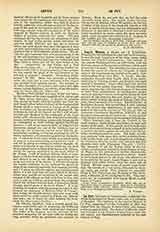

Leon, Luis DE, Spanish poet and theologian, b. at Belmonte, Aragon, in 1528; d. at Madrigal, August 23, 1591. He came from an honorable bourgeois family, his father being “king’s advocate” at Madrid. At fourteen the youth was sent to Salamanca to study law. Six months later he entered the Augustinian convent of that city. After completing his theological studies and obtaining his university degrees (1560) he was appointed to the chair of theology. The decree of the Council of Trent as to the authenticity of the Vulgate was then causing great dissension among the professors at Salamanca. Some of them, Grajal, Martinez, de Leon, and others continued to use in their courses or in their exegetical writings the Hebraic texts, the Septuagint, and even the version of Vatable. Some, like Medina and Leon de Castro, saw in this a defiance of the council’s decree, and effectively denounced their adversaries, whom they called rabbinists. Early in 1572 Grajal and Martinez were arrested at Salamanca and accused of heresy. On March 27, de Leon met the same fate, and was incarcerated at Valladolid by order of the Inquisition as being their abettor. After examining his writings and hearing the witnesses, the Inquisition summed up in seventeen propositions the accusations urged against him. In these propositions he was not charged with heresy, but with imprudence and rashness, particularly on account of his rather disrespectful appreciation of the Vulgate. The tribunal at Valladolid, after a trial extending over nearly five years, declared him guilty and asked that he be put to the rack and rebuked. This sentence, however, had to be ratified by the supreme council at Madrid. But nine days later (December 7, 1576) this body reversed the sentence, acquitted de Leon, and ordered his chair to be given back to him, but warned him to be more cautious in his teaching. He renounced the chair, however, for the time being, in favor of the professor who had filled it during his absence, and was satisfied with pecuniary compensation and supplementary teaching.
In 1582 he got into fresh difficulties with the Inquisition, having in some points opposed the doctrine of St. Augustine on predestination. He was summoned before the high inquisitor at Toledo and warned to be more circumspect. He was appointed by the University of Salamanca a member of the committee on the reformation of the calendar, but in 1587 he refused to act on the commission for correction of the Vulgate, declaring that by comparing the present version with the original one would get further away from the Hebrew.
He was appointed provincial of his order a few days before his death. He left many works, published in six volumes (Madrid, 1806-1816). The first five contained his theological writings, of which the most important are Biblical commentaries superior to any of his time (on Abdias, Job, the Epistle to the Galatians, and the Canticle of Canticles). The sixth volume (contains his vernacular writings: “La perfecta casada” (The Perfect Housewife); “De los nombres de (Cristo”, a metrical version of the Canticle of Canticles (employed against him on his trial), versions of the Eclogues and the Georgics of Virgil, versions of thirty odes of Horace, of forty psalms, and a few original odes, the most celebrated of which are: “The Prophecy of the Tagus”, “The Life of the Fields”, “The Serene Night”, “Hymn on the Ascension“. “La perfecta casada”, one of the gems of sixteenth century pedagogical literature, has recently been edited by Elizabeth Wallace (Chicago University Decennial Publications, 1903); for a French version see Jane Dieulafoy “La Parfaite Epouse” (Paris, 1904). Despite a certain unevenness of style Luis de Leon is one of the greatest masters of Castilian lyric poetry. His virile national spirit, at once religious and patriotic, and his rare classical purity, magnanimity, and sure judgment conspire to save him from effeminacy, affectation, and pedantry.
ANTOINE DEGERT

